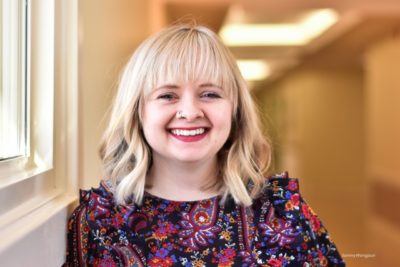
By Rebecca Ihilchik
Therapeutic recreation coordinator Eve Baird is on a mission: to help those living with dementia sleep better. Working with long-term care residents at Fredericton’s York Care Centre, she knows firsthand the difference a good night’s sleep can make.
“If a resident doesn’t sleep well, they’re less open to being involved in activities throughout the day,” she says. “Their mood is different. Their appetite is affected. You really do see the changes.”
Sleep disturbances and night restlessness are unfortunately common for those living with dementia, and there aren’t many tangible solutions that don’t involve medication. But Baird noticed that doing activities to relax and engage her clients before bedtime – like playing card games or giving aromatherapy hand massages – had a positive effect on their quality of sleep.
With support from the Centre for Aging + Brain Health Innovation (CABHI), Baird is taking her homegrown idea to the next level. She’s creating and testing a toolbox for caregivers called The Sleep Kit – an accessible, drug-free solution to the problem of poor-quality sleep.
The Kit contains 13 items that caregivers can use with older adults to encourage one-on-one engagement before bedtime. Among them are custom-made dementia-friendly colouring books and markers, chamomile tea, a hair brush, a CD with calming music, and essential oils.

“The goal is to improve sleep, but the Kit is also about taking it back to the basics of human connection and how powerful that can be,” Baird says. “When people are experiencing agitation or are anxious, often they just need somebody there to spend time with and put them at the centre.”
The sleep issue also affects family caregivers, who often don’t get enough rest if they are caring for their agitated loved ones at night.
“It’s important for both people,” says Baird. “If someone living with dementia is going to be up all night, you know their caregiver is too, because they’ll be wanting to meet their needs.”
Real-world testing yields positive results
With joint funding from CABHI and the New Brunswick Health Research Foundation, Baird tested the Kit with caregivers in the Fredericton, Moncton, and Saint John areas, including those caring for older adults living at home as well as those living in long-term care. Using data from Fitbits the older adults wore to bed, as well as reports from the caregivers, Baird tracked the quality of sleep on nights the Sleep Kit was used versus nights without it.
Her preliminary research found that using the Sleep Kit did in fact improve sleep quality. The Kit was particularly successful for the older adults in long-term care, who on average experienced three less bouts of restlessness each night.
Caregivers also responded positively. Over 95% of long-term care caregivers reported that the Sleep Kit was a tool that could assist them in being a more effective care partner, and 81 per cent of caregivers in the community said it promoted discussion and helped them engage with their partner.
Nurse Lorie Yerxa was one of the caregiver participants. She used the Sleep Kit with a long-term care resident who “90% of the time would yell out if you touched them.”
“As a nurse and caregiver, using the Sleep Kit affected my relationship with the resident in a positive way,” Lorie says. “I found that the resident would be more receptive to me throughout the day, compared to before using the Kit.”
CABHI support accelerates point-of-care innovation
Baird says as a clinician she felt empowered by CABHI to drive her solution forward. In addition to funding, CABHI offers acceleration services that support innovators in areas like business development, marketing and communications, and commercialization.
“I knew I wanted to go the commercialization route, but I have no business experience,” she says. “CABHI really helped guide me.”
So what’s next? With CABHI’s help, Baird is working on a plan to scale and spread the Kit to market, to reach a wider audience. She recently participated in a social venture accelerator program at the University of New Brunswick to further hone her business development skills. She’s also writing an academic article for publication with Dr. Janet-Durkee Lloyd, professor at St. Thomas University, who collaborated with Baird on the project.
With a wider release in the works, Baird’s innovation is on its way to ensuring a good night’s sleep for older adults and their caregivers, in New Brunswick and beyond.
Learn more at www.cabhi.com. This project was also supported by the Centre for Innovation and Research in Aging at York Care Centre.

